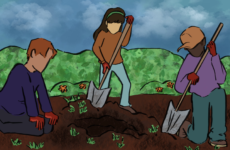During the recent Community Conversation on Jewish identity, Director of Equity and Inclusion Dr. Rachel Myers announced the topic of the next, and final, Community Conversation of the year. As leaders of the Hispanic Latiné Forum (HLF), we had hoped Dr. Myers would say that the conversation would feature Hispanic and Latiné students, continuing the trend of discussing the experiences of different ethnic groups. So, as the words “mental health” left Dr. Myers’s lips, our stomachs dropped.
While there’s no doubt that mental health is a vital topic, we instantly reached for our phones to text each other, seeking comfort after our identities felt, yet again, ignored by those in power at Choate.
Regardless of the size of the Hispanic and Latiné community at Choate and in the United States as a whole, we are continuously disregarded. We are highly underrepresented in high-paying jobs and entertainment, and in 2019, we represented 14.1% of racially-motivated hate crimes. For both of us, growing up in predominantly Latiné communities, the Latiné identifier has influenced every part of our lives. Our racial identity can not be overlooked; rather, it should be celebrated and held deep in our hearts. At Choate, our experiences are defined by our Latiné identities — many of our friendships were formed through this shared heritage.
In the past, Community Conversations have given a voice to groups that are consistently silenced by society. So, as the administration postpones a Hispanic and Latiné conversation, we cannot help but feel that the value of the Hispanic and Latiné community at Choate is being diminished. We are an ethnic group with an incredible amount of diversity and a multitude of stories, yet we have not been given the kind of high-profile platform that would allow us to fully express ourselves.
Following the week of the presidential elections last fall, members of our community were harassed on the street by Wallingford locals. In one horrific instance, someone shouted at two fifth-formers crossing Christian Street, “This is all of your faults. I want those disgusting Mexican criminals out of this country.” (The students reported the incident to the Deans’ Office.) We knew these beliefs existed in the United States, but we never thought that these sentiments would reach campus. The end of the Trump Administration allowed our people to finally take a breath following the surge of anti-Hispanic and Latiné sentiments that swept through the country during Trump’s presidency. We heard our culture ridiculed, saw folks at the border forgotten, were told to assimilate to American culture, and were forced to hide who we truly are. We are tired, but the work isn’t over.
After the announcement, we held an impromptu HLF cabinet meeting to draft an email to Choate’s Hispanic and Latiné community in hopes that our club members find solace in our words. We eventually wrote, “We understand the importance of representing all marginalized communities, but it hurt to not be acknowledged. This might be going through many of your minds, and we just want you to know we are here for you. We are doing our best to change this narrative, but in the meantime please use us as a resource.” Several members of our club quickly responded to express our shared frustration. In this difficult moment, Choate’s Hispanic and Latiné community found comfort in the only people who we knew would have our backs — each other.
On behalf of the Hispanic and Latiné community, we reached out to those in positions of power. After meeting with Associate Director of Equity and Inclusion Mr. Filipe Camarotti, we finally felt that we had an answer: the School plans to host a Latiné-Identifying Community Conversation in September 2021, during Hispanic Heritage month.
While we are happy that this event will take place, those who are members of the Hispanic and Latiné community know that the fight is far from over. We, as a School, must continue to work to make both Choate and the outside world an inclusive environment and a community where we can all thrive — and where those in the Hispanic and Latiné community no longer feel marginalized or forgotten.
Still, we look forward to our Community Conversation, and we know that it will be an important step in allowing the voices of Choate’s Hispanic and Latiné community to be fully heard.




